Top Electrical Distributors in USA

Electrical distributors retail and distribute electrical products including wires, lighting, automation systems, controls, and related services. These distributors are involved in construction, industrial, commercial, and utility markets.
The electrical distribution market of the USA is sizable and the industry’s worth is predicted to surpass $140 billion by 2025. Some factors attributing to this growth include developments in construction works across the globe, improvements in industrial technology, and the need for conformity to power efficiency processes.
This blog aims to focus on the top electrical distributors in the USA and learn about their operation strategies, services, and characteristics. It is a useful tool for specialists from the sphere as it sheds light on the main market players and their activities.
1. Wesco International

Wesco International is a supply chain solutions company. This company was founded in 1922, its products reach various markets within the construction, industrial, utility, and commercial sectors.
Wesco International is crucial in the electrical distribution industry operating in the United States of America. Currently Wesco ranks among the largest electrical distributors in the United States.
Pros and Cons
Pros:
- Comprehensive Product Range: The electrical and industrial inventory list is currently available in Wesco so the customers will have choices.
- Technological Integration: The company incorporates the best IT in supply chain management and offers excellent services and customer-centered e-business solutions.
- Strong Financial Performance: Wesco is a large distributor whose sales volume is large and capable of fulfilling market demand for its products as its sales revenue is relatively high.
Cons:
- Complexity in Operations: Wesco has a large coverage area, and it is present in several countries. This factor itself should raise eyebrows when it comes to service provision.
- Competition: Wesco also has many rivals in a similar industry. These are greatly likely to influence the market share and profits.
- Dependence on Market Conditions: This implies that Wesco’s business operation relies heavily on the construction, industrial market, and utility since it fluctuates the economy.
2. Sonepar USA Holdings Inc.
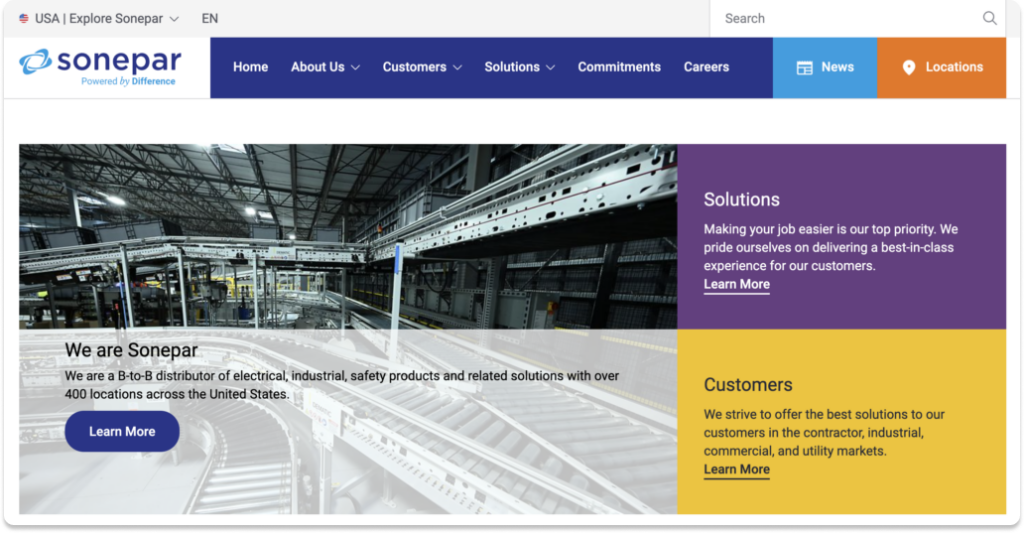
Sonepar USA is engaged in its electric market through several regional companies and supplies electrical products and services all across America. It supplies various industries which include industrial, commercial, and residential ones.
Sonepar USA is one of the key players in the electrical distribution industry. It ranks among the largest electrical distributors in the country. Furthermore, Sonepar USA has access to over 700 branches, which deliver wide coverage of markets.
Pros and Cons
Pros:
- Diverse Subsidiaries: The Company has multiple regional brand names, thus expanding its market presence and product focus.
- Strong Market Presence: Sonepar USA has more than 700 locations, which helps the company adequately cover all markets and become available to many consumers.
Cons:
- Operational Complexity: Co-ordinating operations of several independent subsidiaries can be problematic and cause operational inefficiencies.
- Competitive Market: Sonepar USA experiences high competition from other electrical distributors in the United States, posing a threat to its market share and profitability.
Discover the eCommerce platform distributors love. Elevate your B2B business with the top choice in the industry!
3. Graybar Electric Co.

Graybar Electric Co. offers electrical, lighting, and related products for construction, industrial, utility, and commercial applications. Currently, the company has over 290 distribution centers in North America thus providing adequate coverage of the market and timely delivery of the products.
The importance of the company can also be attributed to its dedication to establishing exceptional customer service alongside providing value-added services such as logistics, project, and technical support services.
Pros and Cons
Pros:
- Wide Distribution Network: Graybar has more than 290 electrical supply facilities and guarantees extensive coverage and perfect site selection that increases customer accessibility and work speed.
- Comprehensive Services: Customers benefit from outsourced value-added services such as logistics, project management, and technical support provided by Graybar.
Cons:
- Operational Scale: The scale of operations may result in certain organizational problems and control of the goods flow and stocks, which may negatively reflect.
- Economic Dependence: The company’s performance is constrained by business conditions in the construction, industrial, and utility sectors hence it remains vulnerable to business cycles.
4. Rexel Holdings (Rexel USA)
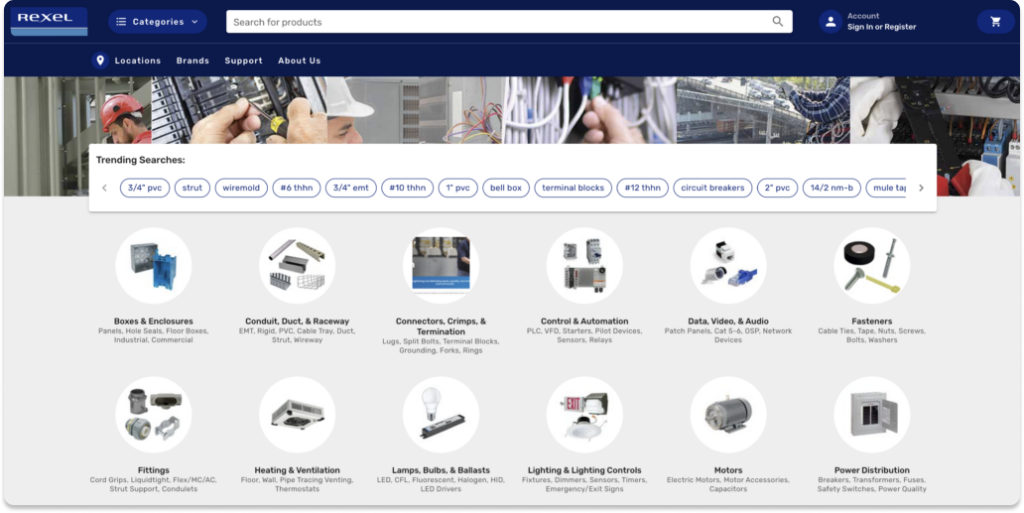
Rexel USA is a global electrical distributor with products and solutions for the Industrial, Residential, and Company sectors. It has several branch offices in different States of the United States and its services cover virtually all electrical merchandise and solutions.
Rexel USA is one of the largest electrical distribution companies and It is a solutions provider specialist in lighting, wiring devices, automation, and energy management. A broad distribution network including over 190 branches across the United States of Rexel USA shields the market and customers effectively. The continued emphasis on the company’s digital initiatives underscores its commitment to offering the latest solutions optimizing the online shopping experience and leveraging the power of big data.
Pros and Cons
Pros:
- Broad Product Offering: Rexel USA offers everything from standard electrical parts and equipment to strategic controls and energy management systems for different client requirements.
- Strong Supplier Relationships: The management sustains good business relations with some of the best production companies to guarantee quality goods.
Cons:
- Market Competition: Risks: Intensified competition from the other major electrical distributors reduces the ability to control market share and subsequently reduces profit margins for Rexel USA.
- Economic Sensitivity: Its business is affected by economic circumstances in the industrial, commercial, and residential markets.
5. Consolidated Electrical Distributors (CED)

Consolidated Electrical Distributors, Inc. has more than 700 stores across the United States of America and provides electrical products and services mostly in construction, industrial, and commercial fields.
CED Electrical is a significant distributor of electrical products within the U.S. market. The elaborate structure of the company’s branches and offices ensures that each branch functions as an individual enterprise, catering to the demands of the particular region and providing clients with personalized services and a varied choice of products. As a prominent company in the construction equipment rental industry. The company has established many branches which will give it a wider coverage and reach geographical areas and hence can be relied on by a wide customer base.
Pros and Cons
Pros:
- Local Market Expertise: CED’s organizational model is very decentralized. Each branch can operate independently. The services they offer are much closer to client needs in the marketplace.
- Strong Customer Relationships: The company establishes customer relations, and thus, there is always high patronage from the customers.
- Flexibility and Agility: This autonomy in branch operations also fosters speedy decision-making and responsiveness to ever-shifting market demands.
Cons:
- Limited Centralized Control: It also means difficulties in coordinating processes and integrating new initiatives on an organization-wide basis.
- Resource Allocation: Coordinating resource allocation across multiple independent branches is often not easy to achieve, which might result in an unbalanced distribution of goods and services.
6. Border States Electric
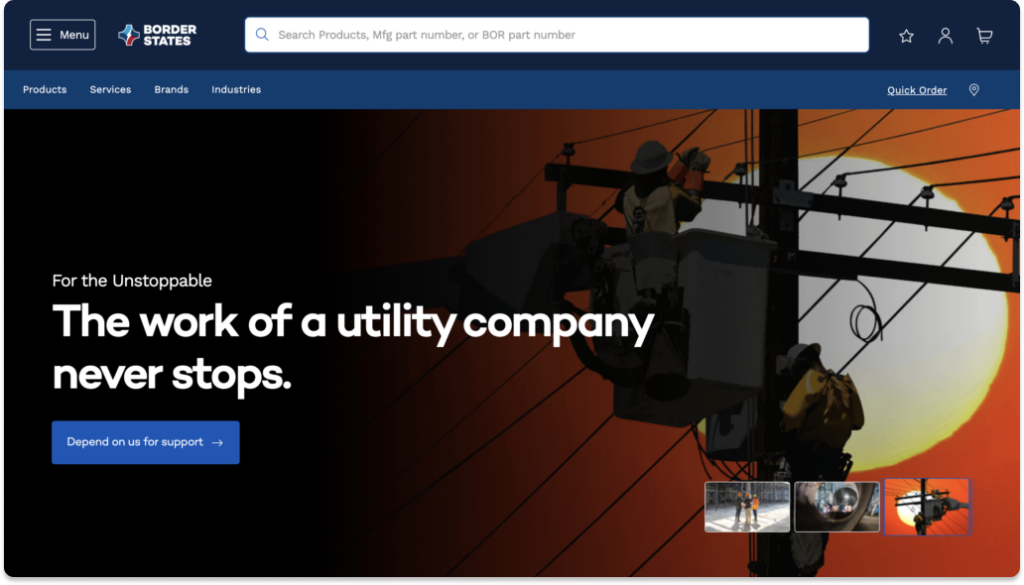
BSE caters to markets such as construction, industries, and utilities offering a complete electrical product portfolio. Border States Electric is a big industry that deals with the electrical distribution industry in the United States of America. This environment has created a culture of ownership and accountability. The company is employee-owned, which commits positive consequences to customers including high satisfaction and service quality. The commitment to the community strengthens its status and relevance in BSE.
Pros and Cons
Pros:
- Employee Ownership: BSE has an employee-owned structure, and the service delivery of this organization is, therefore, efficient and responsive to customers’ needs with high employee commitment to labor.
- Technical Expertise: The company also offers extensive technical support and turn-key specialized services; to assist customers in the best electrical solutions and systems.
Cons:
- Resource Allocation Challenges: Controlling and delivering resources in medium but not very spread out places.
- Market Vulnerability: It exposes BSE to higher risk if such regions or sectors perform poorly or undergo transformations.
Discover the preferred eCommerce platform for distributors and elevate your B2B business to new heights with industry-leading solutions!
7. City Electric Supply Co.

City Electric Supply Co. is one of the most recognizable companies in the U. S. electrical distribution industry. The large number of branches establishes a vast geographic reach and accessibility. This corporate entrepreneurial strategy has been the key success factor at CES due to its culture of creating and maintaining relevant customer relationships.
Pros and Cons
Pros:
- Entrepreneurial Culture: The strong orientation towards entrepreneurship fosters innovation and makes CES a flexible company.
- Extensive Branch Network: It is also observed that CES boasts of over 630 branches and this guarantees the market is covered well and products are made easily available to the customers.
Cons:
- Operational Fragmentation: The operational scale needs to improve in that many branches make it difficult to implement and control consistency across the establishments.
- Market Segmentation: The major weakness of the CES is that it targets some niches and may need to reinvent itself to start operating in other developing fields.
8. Elliott Electric Supply Inc.
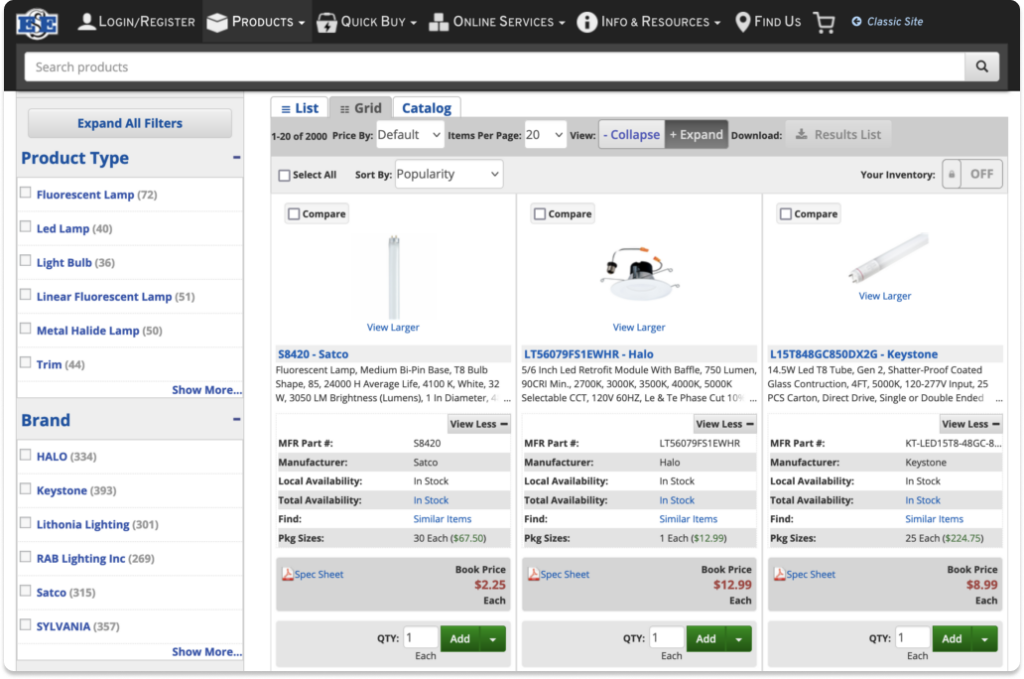
Elliott Electric Supply Inc. offers various electrical products and services to the business, industrial, and retail sectors. Elliott Electric has over 180 branches throughout the southern region of the United States of America.
Elliot Electric Supply Inc. has a competitive position in its industry especially in the southern region. Many of its branches are located across the country. Product differentiation and superior customer care to the clients complement the existing and vigorous product portfolio the company offers at affordable prices to the marketplace to improve its rank in the industry.
Pros and Cons
Pros:
- Regional Strength: From its location, Elliott Electric has established deep local communication with its customers and a clear understanding of the southern U.S. markets.
- Customer Service Focus: A prime focus of the company has been the clients, hence positive images, client satisfaction, and customer loyalty.
- Competitive Pricing: Competitive pricing policies mean that customers choose Elliott Electric. This expands the company’s market base leading to better market positioning.
Cons:
- Limited National Reach: Although it is a strong regional player in the southern part of the United States, Elliott Electric has a nationwide footprint and a smaller market than some national competitors.
- Dependence on Regional Markets: The focus on the southern part of the U. S exposes the company to regional economic swings, which can affect business outcomes.
9. McNaughton-McKay Electric Co.
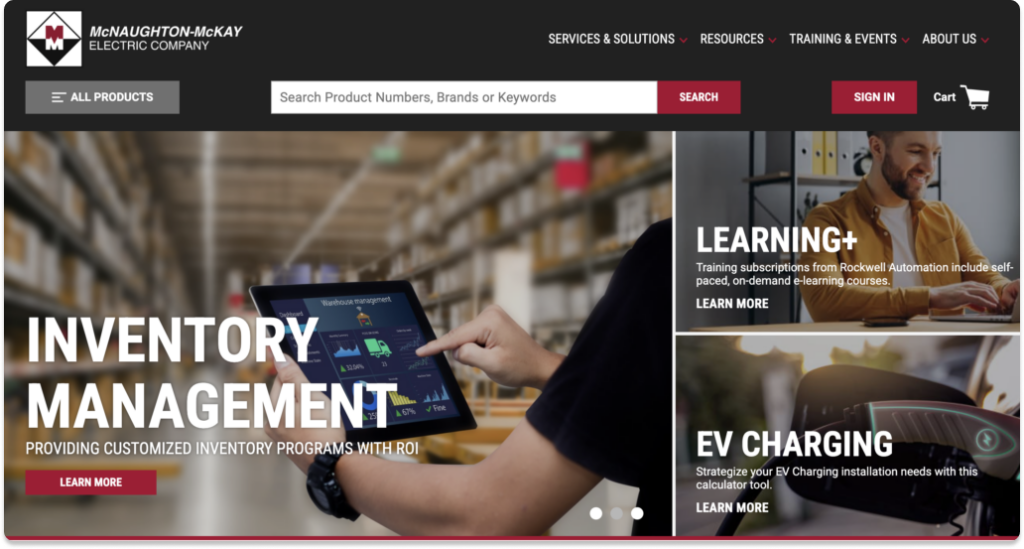
McNaughton-McKay currently has over 18 locations in the U. S. and supplies electrical products such as automation systems control equipment and power distribution.
McNaughton-McKay Electric Co. is a major stakeholder in the U. S electrical distribution industry which focuses on technical competency and its commitment to customer care makes McNaughton-McKay even more significant, particularly as it continues to work in fields that demand unique technologies and professional service.
Pros and Cons
Pros:
- Specialized Solutions: The company deals in various specific services and goods mainly industrial, commercial automation, and control solutions.
- Industry Focus: Focusing on the automotive and industrial industries helps the company deliver more specialized solutions while developing a solid market position.
Cons:
- Regional Concentration: However, its geographic coverage seems to be restricted to some extent since McNaughton-McKay’s widespread affiliate network does not cover the entirety of the country.
- Scale Limitations: McNaughton-McKay being a company that deals in a limited group of related products may be constrained by competition from larger distributors who deal in a wide range of products.
10. U.S. Electrical Services
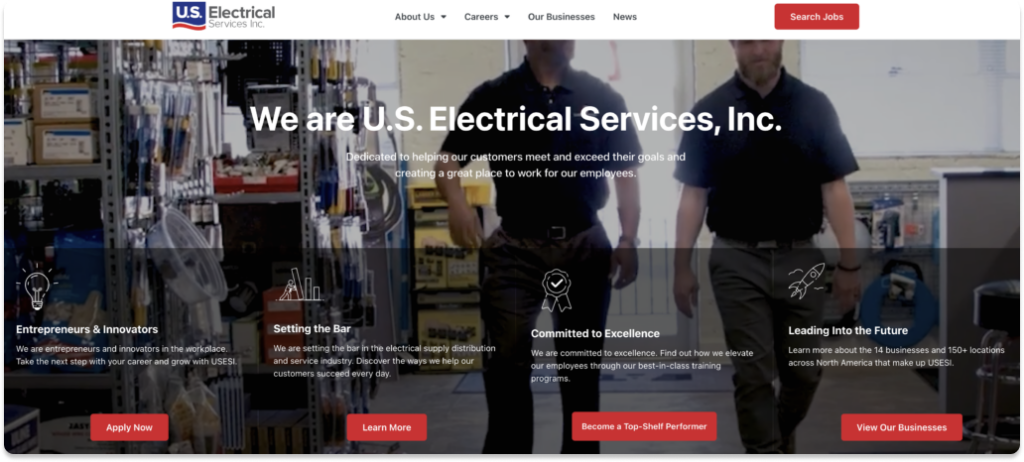
USES is an electrical distributor that supplies and distributes electrical products and equipment combined with services to the commercial, industrial, and residential divisions. It was established in 2000 and currently has premises in several states within the United States of America.
USES has established its centers in over 150 locations in the country. There is evidence of the company’s high position in the market due to proper coverage of the necessary electrical products and appreciable concentration on customer services.
Pros and Cons
Pros:
- Comprehensive Product Range: This electrical company supplies a comprehensive range of electrical products and services to meet varying customer demands across various industries.
- Nationwide Network: The geographic distribution of its facilities, which include more than seventy outlets across the country, also makes it easy for its customers to access them.
Cons:
- Integration Challenges: The company expanding by acquiring other businesses and offices means that working operation and quality of service can be compromised.
- Market Saturation: The fact that it is operating in a very competitive environment with many more established competitors may affect the ability of USES to disentangle itself from the market.
11. Robertson Lighting Solution

RLS specializes in commercial, industrial, and residential lighting fixture products and services. Robertson Lighting Solution provides consultancy in lighting design and project management on efficient lighting solutions.
Robertson Lighting Solution sits in a key position in the context of the distribution of lighting products in the U. S. Some of their products include LED lighting, control systems, and efficient energy products. Robertson Lighting Solution specializes in lighting design and project management services. Its concentration on energy-saving solutions corresponds with the increasing number of requests in the modern market.
Pros and Cons
Pros:
- Specialized Expertise: Due to the focused positioning of Robertson Lighting Solution company on lighting products and solutions, the customer gets professional consultation and high-quality products corresponding to essential lighting requirements.
- Energy-Efficient Solutions: The company focuses on energy-efficient lighting that is incorporated into green building practices, and helps reduce expenses.
- Comprehensive Service: To provide products, Robertson Lighting designs and manages projects, thus going beyond basic supply activities and assisting clients at various project phases.
Cons:
- Regional Limitations: It also focuses mainly on some areas and this limits its reach in the market as it cannot attend to clients in regions throughout the Country.
- Competitive Sector: The global lighting distribution market is still very competitive and Robertson Lighting Solution needs to find ways to stand out from the other specialized and general distributors.
12. Regency Supply
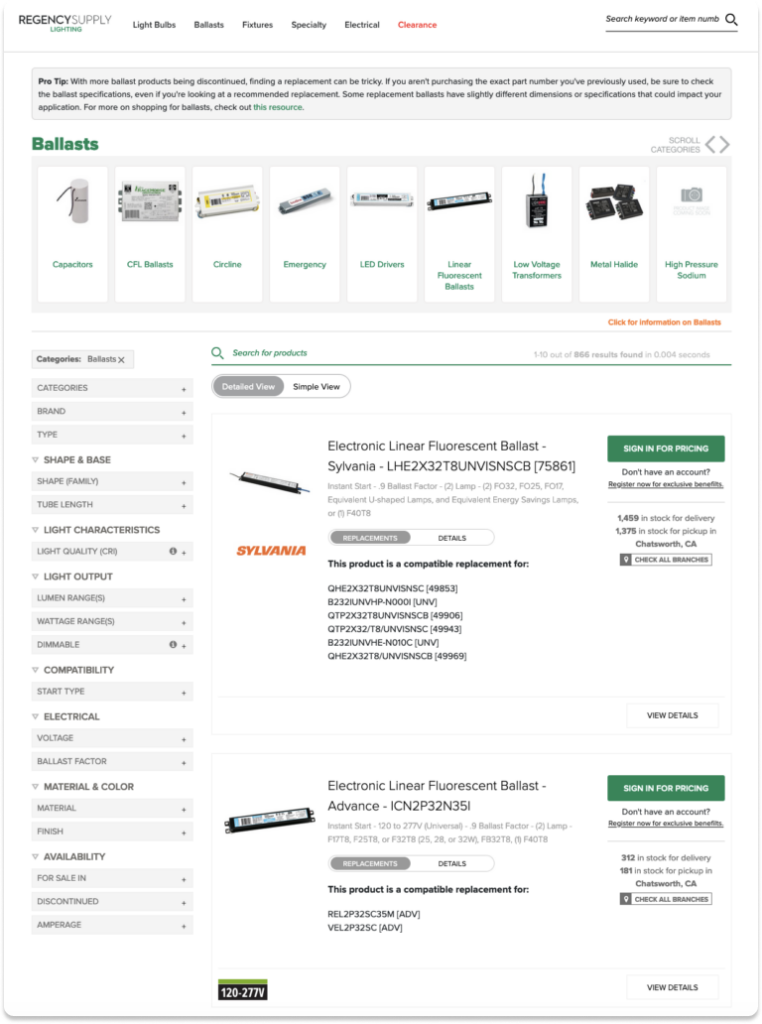
Regency Supply deals in electrical contracting products and solutions, electrical components, lights, and maintenance accessories and equipment The company offers its solutions in numerous segments that include commercial, industrial, and residential ones, targeting product sales with added services.
Regency Supply occupies a large share of the U. S. electrical distribution industry. Overall, Regency Supply utilizes high-quality products and customer-specific services to suit its main target market which covers the Northeast and Mid-Atlantic regions.
Pros and Cons
Pros:
- Regional Focus: The company’s concentration in the Northeast and Mid-Atlantic segments helps the company establish good affiliations and offer relevant services to specific markets.
- Customer Service: The approach of the Regency Supply Company to provide tailored customer services makes it attract more consumers and customer loyalty.
Cons:
- Limited Geographic Reach: The Company focuses on regional expansion which may negatively impact its overall national market share outside its strong areas.
- Smaller Scale: This company is small compared to its counterparts for example the Hilti Company, Regency Supply can be affected by issues of power and scale.
- Dependence on Regional Markets: Implemented strategic focuses on those regions that create risk and uncertainty to Regency Supply for the changes of economic conditions in those attentive areas.
Conclusion
The electrical distribution market in the USA can be characterized as continuously growing and vital for the country’s economy with market leaders such as Wesco International, Sonepar USA, Graybar Electric, etc. Every distributor, from the large ones like Graybar to those like Robertson Lighting Solution is, thus, different; in terms of their specialties and capabilities such as large product portfolios, geographic focus, or service offering capabilities. By identifying these top distributors and their positions in the marketplace, interested industry participants and consumers can benefit from a greater knowledge of the distribution landscape.
Engage in a conversation with our experts and unlock custom solutions for your business need!
